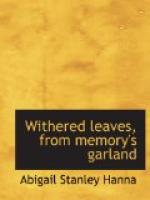“Me no forget white squaw—me bring moose meat for white squaw.”
Soon they marched away, in Indian file, and as their dusky forms disappeared, one after another, behind the forest trees, her heart rose in thanksgiving to God, for her preservation. Dove Eye lingered till the rest of her tribe vanished from sight; there was sadness in her countenance, and sadness in her voice, as she said,
“Dove Eye see white squaw no more. Dove Eye go toward the rising sun, but Dove Eye come no more.”
Mrs. Fuller pressed her hand affectionately, and commending her to the Great Spirit, she departed to overtake her companions. The children emerged from their hiding places, a cheerful fire burned upon the hearth, and the weary mother prepared the morning meal for herself and her children, with a grateful heart.
When the wandering tribe returned again towards the setting sun, Dove Eye was not with them—she had “gone to the land where her fathers had gone.”
Years passed on—years of trial, of anxiety, and of change. The tall forest trees gave place to cultivated fields and blooming orchards.
Roads traversed the vast country in every direction. Numerous villages rose up, on the flourishing banks of the winding Kennebec, and its proud waters bore many a whitened sail upon its surface.
The red men of the forest have passed away, like the withered leaves before the autumnal gale, and the wild bear and deer are now strangers in their secluded haunts.
The young wife and mother passed from the sober matron to mature age, and there were deep furrows upon her cheek, and the frosts of many winters whitened her hair; but when she related the events of that night to her grand-children, or great-grand-children, she ever spoke with trembling voice, and called it the “long fearful night.”
On Hearing a Bird Sing,
December, 1826.
Cease, little warbler, cease thy lay,
For summer, with her sunny day,
Far to the south has fled away;
And autumn’s
chilly finger
Has touch’d the leaf on ev’ry
tree,—
And blighted everything we see;
Then, warbler,
do not linger.
Fly where groves of citron bloom,
And orange orchards shed perfume,
And birds of ev’ry varied plume
With music charm
thee:
Fly, little warbler, quickly fly,
Far, far away to southern sky,
Where nought can
harm thee.
For, oh, it is no careless voice—
That bids thee fly and seek for joys,
And shun the rushing whirlwind’s
noise,
That soon will
pass before thee.
But one, whose bosom knows full well,
The heartless scene, the winter spell,
That soon will
hover o’er thee.
Variety.
Variety is sweet to me
As many blossoms to the bee;
And I will roam from flower to flower,
Sipping honey ev’ry hour;
I will wander with the bee,
And drink thy sweets, variety.




